“We do think that the legislation should make it abundantly clear that practical applications of genetic material…. merit protection…. Section 101 must incentivize such innovation accordingly so that companies have certainty to invest in personalized treatments for the benefit of patients.” – Laurie Hill, Vice President, Intellectual Property, Genentech

Senator Mazie Hirono (D-HI)
Yesterday, we ran a series of excerpts from responses to Senator Thom Tillis’ (R-NC) questions for the record to panelists following the June hearings on U.S. patent eligibility law, held by the Senate Judiciary Committee’s Subcommittee on Intellectual Property. Along with Tillis and Senator Richard Blumenthal (D-CT), Senator Mazie Hirono (D-HI) also posed several questions to the participants in the 101 hearings. Hirono’s questions overall demonstrate a good faith desire to get to the heart of the problems in search of real solutions.
While the bill to amend Section 101 seems to be currently back at the drawing board, it’s worth understanding the breadth of opinions on Hirono’s wide-ranging questions. For instance, it’s interesting to note that Kate Ruane of the American Civil Liberties Union (ACLU) clarified in her responses that “the debate about the proposal’s application to genes was never about whether the proposal would apply to genes when they exist in the human body.” This is not news to most IPWatchdog readers, but ledes and headlines put out by the ACLU such as “Did you know that private companies can patent genes in your body?” and “ACLU and Coalition Partners Oppose Draft Legislation That Would Permit Patents on Human Genes,” suggested to the general public that that’s precisely what the debate was about. Of course, Ruane argues that isolated DNA patents still reduce patient access, but Sherry Knowles has covered here in depth why such headlines and characterizations can be dangerous and lead to “incorrect emotionalism”.
Here are some more excerpts from the written responses to Hirono.
Questions from Senator Hirono
1. Last year, Judge Alan Lourie and Judge Pauline Newman of the Federal Circuit issued a concurring opinion to the court’s denial of en banc rehearing in Berkheimer v. HP Inc., in which they stated that “the law needs clarification by higher authority, perhaps by Congress, to work its way out of what so many in the innovation field consider are § 101 problems.”
Do you agree with Judges Lourie and Newman? Does § 101 require a Congressional fix or should we let the courts continue to work things out?

Alex Moss, EFF
Alex Moss, Staff Attorney, Electronic Frontier Foundation
“The data shows that there is no lack of clarity. The Federal Circuit agrees with district courts about the application of Section 101 the overwhelming majority of the time—in fact, more often than it does on other patent issues. A study found that for the three years following the Alice decision, the Federal Circuit had an affirmance rate of about 88% in § 101 cases. That contrasts with an overall affirmance rate in patent cases of around 75%…
“Even those numbers understate the Federal Circuit’s affirmance rate on Section 101 because ‘[t]hey omit non-precedential opinions and summary affirmances under Rule 36…’
“Judges Lourie and Newman are not calling for congressional action because they find the law too confusing to apply; they simply disagree with the Supreme Court about the value of patents, particularly on laws of nature and things that occur in nature.”
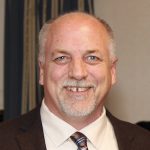
Paul Morinville, U.S. Inventor
Paul Morinville, President, U.S. Inventor
“Yes. Current 101 case law cannot be deciphered or understood. It is illogical and unworkable. No inventor, no examiner, no lawyer, and no investor can know if any patent will pass muster in a [trial] court and if it does, in the CAFC because even the courts can’t explain it…
“The Supreme Court has shown that they are not interested in fixing the 101 demon that they themselves let loose on the market. They have refused to take up 42 cases since the Alice decision…
“Congress must act now. The damage is wiping out an entire generation of inventors and startups. Inventors are patenting in China as a result. If we fail to act now, by default, we as a nation have agreed that we no longer value a patent system and are willing to accept the consequences.”
2. The Federal Circuit rejected a “technological arts test” in its en banc Bilski opinion. It explained that “the terms ‘technological arts’ and ‘technology’ are both ambiguous and ever-changing.” The draft legislation includes the requirement that an invention be in a “field of technology.”
a. Do you consider this a clear, understood term? If so, what does it mean for an invention to be in a “field of technology”?
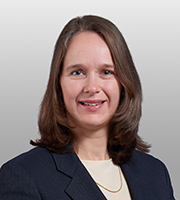
Natalie Derzko, Covington
Natalie Derzko, Of Counsel, Covington & Burling LLP, On behalf of Pharmaceutical Research and Manufacturers of America
“PhRMA believes that the term ‘field of technology’ would encompass inventions and discoveries broadly in the biopharmaceutical space, and would include diagnostic methods and nature-based products, such as vaccines and antibiotics, and other types of medical advances… If the term ‘field of technology’ is removed from Section 100 in the legislative proposal, it is nonetheless important for Section 101 to maintain a technology-neutral stance so as to comply with the United States’ international obligations and to allow U.S. patent law to adapt more easily to new technology not yet invented.”
b. The European Union, China, and many other countries include some sort of “technology” requirement in their patent eligibility statutes. What can we learn from their experiences?

Sean George, Invitae
Sean George, Chief Executive Officer, Invitae
“Invitae does not believe that these requirements in other jurisdictions are good models for addressing the policy challenges of the current Supreme Court case law on patentable subject matter. First, quite apart from issues of patent eligible subject matter, both the Chinese and European patent systems are generally more restrictive than the USPTO in terms of the scope of patent coverage that can be obtained from a given patent application… Second, the issue under consideration in the draft legislation is whether and how to address the policy questions associated with the Supreme Court’s holdings that patent claims directed to natural laws, natural phenomena, and abstract ideas should not be patentable. It is quite possible to present such claims in association with some conventional technology (e.g. exploitation of an abstract idea using a computer) and doing so does not, under current law, render such claims patentable.”
c. Is a claim that describes a method for hedging against the financial risk of price fluctuations—like the one at issue in the Bilski case—in a “field of technology”? What if the claim requires performing the method on a computer?

Mark Lemley, Stanford University School of Law
Mark Lemley, William H. Neukom Professor of Law, Director, Program in Law, Science & Technology, Stanford University School of Law
“My personal view is that financial methods are not a ‘field of technology,’ but I know there are some who disagree. I think implementing something on a computer does not make it technological. Selling pet food on the Internet isn’t a technological invention. To me, the term requires an improvement in the technological area itself, not merely employing technology in a non-technological area.”
d. What changes to the draft, if any, do you recommend to make the “field of technology” requirement more clear?
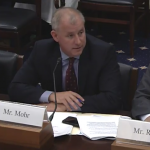
Christopher Mohr, Software and Information Industry Association
Christopher Mohr, Vice President for Intellectual Property and General Counsel, Software and Information Industry Association
“While not sufficient to overcome our concerns with the balance of the draft, we view the changes to section 112(f) as helpful in preventing overbroad functional claiming. The problem that the software industry faces is the exact opposite: the current statute is being interpreted to permit applicants to claim inventions that do nothing more than recite a desired property or a result in a way that encompasses all ways of achieving that result. Designing around the disclosed invention is a legitimate and important commercial practice—one that is essential to innovation. Section 112(f) provides protection to the claimed invention ‘and equivalents’ as provided in the written specification.”
3. Sen. Tillis and Sen. Coons have made clear that genes as they exist in the human body would not be patent eligible under their proposal.
Are there other things that Congress should make clear are not patent eligible? There are already statutes that prevent patents on tax strategies and human organisms. Are there other categories that should be excluded?

Kate Ruane, ACLU
Kate Ruane, Senior Legislative Counsel, American Civil Liberties Union
“The debate about the proposal’s application to genes was never about whether the proposal would apply to genes when they exist in the human body. The debate in Myriad was not about genes when they are ‘in the body,’ but about the PTO’s policy of granting patents on ‘isolated DNA’ (DNA isolated from the cell), and related broad methods of comparing genetic sequences…
“To be clear, the patents that were approved by the PTO before the Supreme Court decision were on human genes. These patents covered thousands of genes and the isolation of these genes/DNA did not change the fact that the patents claimed human genes…
“The fact that the genome now has been published also would not mitigate the potential harmful effects of expanding patent-eligibility to allow for the patenting of isolated genes/DNA once again. We know that variants are continuously being identified, as well as connections between portions of DNA with various conditions, etc.. If the prohibition on patenting laws of nature, products of nature, and abstract ideas is erased, there is nothing in patent law that would categorically stop these types of patents in the future.”

Laurie Hill, Genentech
Laurie Hill, Vice President, Intellectual Property, Genentech
“We agree that no one should be able to patent gravity, a mathematical equation, or a purely mental process. We also agree that no one should be able to patent an intangible idea, an aesthetic creation, or a work of literature…
“However, we do think that the legislation should make it abundantly clear that practical applications of genetic material, such as medicinal compositions that consist of fragments of genetic material, merit protection. An example of this is personalized cancer regimens that use nucleic acid sequences encoding a portion of a patient’s own tumor to stimulate the immune system to fight the tumor. Section 101 must incentivize such innovation accordingly so that companies have certainty to invest in personalized treatments for the benefit of patients.”
4. I have heard complaints that courts do not consistently enforce Section 112 with respect to claims for inventions in the high tech space.
a. Are these valid complaints?
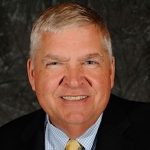
Phil Johnson, 21C
Phil Johnson, Chair, Steering Committee, Coalition for 21st Century Patent Reform
“[T]he determination of whether or not the court is properly applying Section 112 is highly fact and technology specific, and must be evaluated on [a] case by case basis…
“It is of course common for parties who have lost a case to complain that it was the fault of the court. But in the Section 112 area, there is well developed precedent as to what is required of a patent’s written description, what is required to enable a claimed invention, how an invention may be claimed, and what degree of definiteness is needed. Errors of law pertaining to these requirements are appealable and are considered by the Federal Circuit de novo.
“In 21C’s view, the courts do a very good job in handling Section 112 challenges at all stages of the litigation, and the Federal Circuit pays close attention to Section 112 appeals. Because Section 112 disclosure requirements are necessarily technology specific, there always has been, and continues to be, an evolution of case law addressing new technologies.”
b. Do the proposed changes to Section 112 adequately address those complaints and limit the scope of claims to what was actually invented?
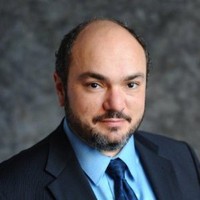
Gonzalo Merino, Regeneron
Gonzalo Merino, Vice President and Chief Intellectual Property Officer, Regeneron Pharmaceuticals
“I believe that the proposed changes to Section 112 are necessary to ensure that patents are not overly broad and that they serve their constitutional mandate to promote the progress of science. Due to the imprecise nature of functional language, claims containing such language may be interpreted so broadly so as to go well beyond what was actually invented… In the field of medical innovation, such patents might prevent the development of life-altering treatments for the benefit of patients.”
c. Are you concerned that the proposed changes will make it too easy for competitors to design around patent claims that use functional language?

Laurie Self, Qualcomm
Laurie Self, Senior Vice President and Counsel, Government Affairs, Qualcomm
“Yes. Whether section 112(f) is deemed to apply to a patent has tremendous ramifications for whether the patent is deemed infringed—when section 112(f) applies, the claim limitation specifying a function is effectively limited to only the corresponding structure recited in the specification itself. This means that an accused infringer only needs to make a minor change from the structure described in the specification to not infringe. Thus, when section 112(f) applies, infringement is rarely found…
“Greater difficulty in enforcing patents against copycat products will lead to a negative effect on innovation.
5. There is an intense debate going on right now about what to do about the high cost of prescription drugs. One concern is that pharmaceutical companies are gaming the patent system by extending their patent terms through additional patents on minor changes to their drugs. My understanding is that the doctrine of obviousness-type double patenting is designed to prevent this very thing.
The Federal Circuit has explained that obviousness-type double patenting “is grounded in the text of the Patent Act” and specifically cited Section 101 for support.
Would the proposed changes to Section 101 and the additional provision abrogating cases establishing judicial exceptions to Section 101 do away with the doctrine of obviousness-type double patenting? If so, should the doctrine of obvious-type double patenting be codified?
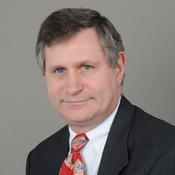
Manny Schecter, IBM
Manny Schecter, Chief Patent Counsel, IBM
“All inventors, not just pharmaceutical companies, make inventions which are improvements of their prior inventions, which is why Section 101 refers to an ‘improvement thereof’. To the extent such improvements are unobvious, they are patentable, subject to the constraint of obviousness type double patenting limiting the patent term to that of the earlier patent. The doctrine of obviousness type double patenting should be retained…
“The case law of obviousness type double patenting is not based on the case law of statutory subject matter, which would be abrogated by the proposed reform of 101. As a result, the doctrine of obviousness type double patenting would not be eliminated by the proposed changes to Section 101… The text of Section 101 upon which obviousness-type double patenting is grounded is not being changed, and the case law interpreting that text is not being changed. If Congress decides to eliminate any ambiguity, it could discuss this in the legislative history or codify the doctrine under Section 103.”
6. In its Oil States decision, the Supreme Court explicitly avoided answering the question of whether a patent is property for purposes of the Due Process Clause or the Takings Clause.
What are the Due Process and Takings implications of changing Section 101 and applying it retroactively to already-issued patents?

Joshua Sarnoff, DePaul University
Joshua Sarnoff, Professor of Law, DePaul University
“[N]othing in the Constitution requires Congress to authorize the grant of any patent. Article I, Section 8, clause 8 only grants power to Congress; it does not impose a duty to exercise that power. So, there cannot be any Due Process or Takings concern when Congress refuses to further extend patent eligibility beyond what the current legislation authorizes…
“[S]uch Due Process and Takings concerns could only potentially arise, in regard to invalidation of previously granted patents, as a result of constricting eligibility law. Because prospectively limiting such patent eligibility is fully within Congress’ power, Congress may do so as long as it adopts legislation bicamerally and with presentiment and Presidential signature or veto override. And there can be no Takings concern when the U.S. government decides not to create a property interest in the first place.”

![[IPWatchdog Logo]](https://ipwatchdog.com/wp-content/themes/IPWatchdog%20-%202023/assets/images/temp/logo-small@2x.png)

![[Advertisement]](https://ipwatchdog.com/wp-content/uploads/2024/04/UnitedLex-May-2-2024-sidebar-700x500-1.jpg)
![[Advertisement]](https://ipwatchdog.com/wp-content/uploads/2024/04/Artificial-Intelligence-2024-REPLAY-sidebar-700x500-corrected.jpg)
![[Advertisement]](https://ipwatchdog.com/wp-content/uploads/2024/04/Patent-Litigation-Masters-2024-sidebar-700x500-1.jpg)

![[Advertisement]](https://ipwatchdog.com/wp-content/uploads/2021/12/WEBINAR-336-x-280-px.png)
![[Advertisement]](https://ipwatchdog.com/wp-content/uploads/2021/12/2021-Patent-Practice-on-Demand-recorded-Feb-2021-336-x-280.jpg)
![[Advertisement]](https://ipwatchdog.com/wp-content/uploads/2021/12/Ad-4-The-Invent-Patent-System™.png)






Join the Discussion
14 comments so far.
Model 101
October 29, 2019 06:15 pmI went to the Senate hearings on 101 Patent Reform in June. What nonsense. No Apple, MicroSoft, Google, HP, Intel, Amazon, FaceBook….not a one. Senator Tillis said he invited them, but they declined. Why should they bother…they’re too busy circumnavigating the globe on their private jets sipping champagne and smoking cigars with members of congress. If Jeff Epstein were alive, he’d be there too with them.
The hearings were a dog and pony show…nothing more.
In June, Tillis said the new bill would be out soon, he wanted to do it fast…It’s now the end of October.
What a waste of time and money!
r.i.p. PATENT Holders
September 9, 2019 07:32 pmI agree with #Modle 101
IT’S GAME OVER SILICON VALLEY OWN THE GAME, THERE WILL NOT BE ANY PATENT REFORM.
PATENTS ARE DEAD AND WILL REMAIN THAT WAY IN THE UNITED STATES. CHINA AND GERMANY ARE THE NEW PLACES TO DO BUSINESS. AMERICA IS A CORPORATOCRACY A TRUE OLIGARCHY THAT HAVE SOLD THEM SELVES TO ONLY CATER TO THE ELITES LIKE APPLE AND GOOGLE.
SINCE THEY BROUGHT IN THE AIA ACT AND THE PTAB EBAY, ALICE, MAYO, TC HEARTLAND ITS BEEN A BLOOD BATH FOR PATENT HOLDERS TO BE ABLE TO PROTECT THEIR IP’S AND TO SEE ANY TYPE OF PAYMENT FOR THEIR INVENTION. I LIKE MANY ARE MOVING TO APPLY FOR PATENT PROTECTION IN CHINA AND GERMANY, IM NOT EVEN GOING TO WASTE MY TIME IN AMERICA ANY MORE, IT’S A CRUMBLING EMPIRE THAT ONLY SERVES THE PLUTOCRACY.
Model 101
September 6, 2019 01:52 pmTruth be told here! But, alas, too late!
Many will not get the medical help they deserve. Inventors won’t invent. SC will continue to use patents illegally. The crooks win!
It’s the new American way!
Software Inventor
August 27, 2019 01:47 pmI suggest the data Alex Moss refers to confirms the holocaust of US patents since SCOTUS exceptions, District Court confusion, AIA / PTAB IPR, and CAFC’s rubber stamp Rule 36 “Affirmed” fully implemented and documented. The US Congress is responsible for this mayhem.
Night Writer
August 27, 2019 08:23 amFunctional language is used to represent known solutions and the solutions enabled in the specification.
No person skilled in the art would dispute this. I have quoted from textbooks that are used at MIT that say this.
What is going on is some game where because there are so many solutions that are enabled by the claim (which is always the case in modern tech) that no solutions are enabled.
Again, looking it from the perspective of the technology person there is no problem with functional language. They know exactly what it means and the set of solutions. The only problem is made up fanacies by judges and lobbyists. (Professors making millions burning down the patent system.)
B
August 26, 2019 01:05 pmTo Laurie Self ““Yes. . . . when section 112(f) applies, the claim limitation specifying a function is effectively limited to only the corresponding structure recited in the specification itself . . . “
“or the equivalents thereof,” Laurie. Read the statute. Also have some of your attorneys write a claim or two with structure to avoid 112(f). Whenever you misrepresent the statute fro the outset, you lose your cred.
B
August 26, 2019 12:53 pmTo Mark Lemley “To me, the term requires an improvement in the technological area itself, not merely employing technology in a non-technological area.”
Where exactly does s101 require “an improvement in the technological area?”
Where does Art I, Sect 8?
Heck, where does s101 require an “improvement?”
Does the song “Kill the Cops” by NWA add to the “sciences” mentioned under Art I, Sect 8, and if not, should we deny copyright protection?
BTW, under your “technological” test almost NO GAMES OR TOYS would be patented. There goes the U.S. toy industry.
Academia is obviously suffering. Read the freaking statue before spewing nonsense.
B
August 26, 2019 12:43 pm“The data shows that there is no lack of clarity.” — Alex Moss, EFF
I’m officially calling Alex Moss a person who does not tell the truth. What data?
Can Ms. Moss tell me why the claims in McRO are patent eligible but the claims in RecogniCorp. are not?
“the Federal Circuit had an affirmance rate of about 88% in § 101 cases”
The NAZI party approved of 100% of the people he slaughtered in concentration camps. Does that make it right? Moss apparently mistakes anti-patent bias with clarity.
Pro Say
August 23, 2019 02:29 pmMark these words:
If Congress were to shockingly permit folks like the EFF, ACLU, and Silicon Valley to get away with blocking or corrupting these innovation-restoring, desperately and critically needed, Section §101 corrective reforms, more than 1,000,000 Americans will die unnecessarily in the years and decades to come … because no companies, universities, or non-profits were willing to risk – or be able to raise — the millions required to invent such innovations.
Thank goodness our Founding Fathers and earlier Congress’ saw fit to protect and preserve them all.
How devastating to our Country that our very own Supreme Court unconstitutionally crushed such life science and computer implemented and related innovations (note the growing convergence of such innovations).
How devastating to our Country that our very own Courts have unconstitutionally crushed — and continue to crush — such innovations through their own misapplication of Mayo / Alice.
Today’s Congress is these 1,000,000+ Americans’ last and only hope.
Today’s Congress is our Country’s last and only hope.
Night Writer
August 23, 2019 12:29 pmThe question asked>>What are the Due Process and Takings implications of changing Section 101 and applying it retroactively to already-issued patents?
Joshua Sarnoff, DePaul University then yaps his little head off and then says, “[S]uch Due Process and Takings concerns could only potentially arise, in regard to invalidation of previously granted patents.”
So the “professor” yaps and then repeats the questions and his yapping is all about trying to limit or end patents.
Why do people listen to this bandits? Do we know if the professor like Lemley is making millions burning the patent system down? Lemley has admitted that he and his wife (a former Google executive) make millions from burning the patent system down. That was in a NYTimes article.
Night Writer
August 23, 2019 12:25 pmACLU >>>“The fact that the genome now has been published also would not mitigate the potential harmful effects of expanding patent-eligibility to allow for the patenting of isolated genes/DNA once again. We know that variants are continuously being identified, as well as connections between portions of DNA with various conditions, etc.. If the prohibition on patenting laws of nature, products of nature, and abstract ideas is erased, there is nothing in patent law that would categorically stop these types of patents in the future.”
Another twisted piece of logic. Why? Because the assumption is that the progress will not be aided by the patents, but rather impeded. There is no evidence for this and all the evidence is the opposite. So, the ACLU talks as if these inventions and discoveries just naturally happen, when we know that is not true and human history tells us it is not true.
And —gee, why is it that the only countries with healthy innovation engines also have patent systems that are strong?
Night Writer
August 23, 2019 12:20 pmMark Lemley >>>“My personal view is that financial methods are not a ‘field of technology,’ but I know there are some who disagree. I think implementing something on a computer does not make it technological. Selling pet food on the Internet isn’t a technological invention. To me, the term requires an improvement in the technological area itself, not merely employing technology in a non-technological area.”
Not surprisingly Mark Lemley says one of the most intentional misleading things possible. Everyone in SV knows —and I mean everyone- that what Lemley said is wrong. Everyone understand that doing something on the computer is technology because it changes the character of how things are done just like how farming is done is changed by a tracktor. Everyone—-Everyone—knows that in SV.
Mark has said this to try and get the technology test that the EPO uses in place as he knows that it effectively destroys the patent system. Europe has 1/10 the software industry as the USA and a lot of that is because of patents.
Night Writer
August 23, 2019 12:15 pmEFF>“Judges Lourie and Newman are not calling for congressional action because they find the law too confusing to apply; they simply disagree with the Supreme Court about the value of patents, particularly on laws of nature and things that occur in nature.”
This is an interesting statement as it attempts to diminish Newman and Lourie, but really it reveals that the 101 jurisprudence at the Scotus is not based on the Constitution or applying statutes, but rather the justices personal opinions about the value of patents.
Name withheld to protect the innocent
August 23, 2019 11:21 amAlex Moss:
B.A. in Government, Harvard College (2005)
Meaning little to no experience in technology. Work experience (https://www.eff.org/about/staff/alexandra-moss) also shows little experience working with inventors/companies who are looking to leverage their patents to build a business. In other words, little to no real-world experience in the field she is opining about.
After graduating from Stanford Law School, Alex developed a a particular passion for patent law while clerking for the Honorable Timothy B. Dyk of the U.S. Court of Appeals for the Federal Circuit.
Timothy Dyk is probably one of the most anti-patent judges around. Surprise, surprise that he fosters the same attitude in his clerks.
It appears that Alexandra Moss is a tool of big-tech (i.e., those that fund EFF) because patents are one of the only things that has the potential to stop these oligopolies. This is why they campaign so hard against them.
Message to Alex — You are not working for the little guy. You are merely advocating for law/policies that allow tech companies with huge market shares (e.g., Facebook, Google, etc.) to maintain those market shares through the misappropriation of technology invented by others. If you ever wondered why there is a huge wealth disparity in the tech industry, it is because those at the top (i.e., the robber barons of the 21st Century) got so wealthy because they rarely had to pay for the technology they stole from others.
Don’t fool yourself, you are a mouthpiece for robbers barons.